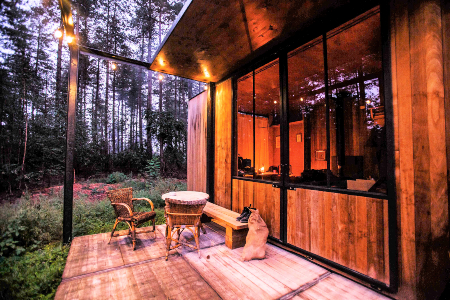 By Ward Shope
By Ward Shope
When we arrived at the New Hampshire cabin on vacation this summer, it was incredibly still. There was no traffic noise, no bustle of people, not even the sound of birds when we first arrived. No leaf fluttered, and only the sound of small insects rubbing their wings or legs could be heard. Debbie and I sat there for an hour? Two hours? Not that it really mattered because with no sound there is the illusion that time refuses to march forward. The only obvious sounds were the thoughts in my brain.
The next morning, the scolding of a catbird shocks the silence, but he/she finally moves on. Our neighbor, several hundred feet away, clears his throat and we realize that even the quiet conversation we are having on the back deck can be overheard by neighbors on both sides even though we can’t see them or their houses. I hear individual water drops hit the ground as they fall from the trees in the woods. The sound barrier is broken by the stillness. Here, a car can move by from time to time—always loudly—but the stillness persistently returns. It refuses to be drowned out.
I believe that God hears us all the time. Our busyness can never drub out the thoughts of our hearts from him. But here, it is impossible for me not to hear myself. Our culture does not deal well with silence—though if we really noticed we are probably gasping for it constantly like a breath of fresh, unpolluted air. We are probably afraid of overhearing ourselves and what it reveals about us.
There is a particular bird that sings in the early morning or late at night. Its call is a clear, multi-toned musical call every minute or so. Sometimes there are two of them involved in beautiful and casual conversation back and forth. Patient in listening and not afraid to speak in each one’s turn. When I hear them I am immediately caught up in attentively eavesdropping. There’s something so attractive about the way they speak or even talk to themselves. Is this the way we are to speak with God?
I listen in on my conversations to myself, to the Lord, to Debbie. The unhurried and fewer words make each one weightier. I am thirsty for this. I find myself praying for all sorts of things that I do not regularly pray for at home. I could claim that there is nothing else to do—but actually it’s more that the silence births the words.
The challenge that I have with my prayers often has more to do with trying to turn them on and off in the busyness of life. At the cabin, our lives are less complicated and prayer simply happens. I yearn for a heart where conversation with the Lord takes priority over the to-do list. I have always valued productive labor, and it encourages trust and success in our world, but underneath it all, conversation—relationship—with God and others demands unhurried time, stillness, silence. When things are finally quiet, that’s when I can hear, and know that I am also heard.
